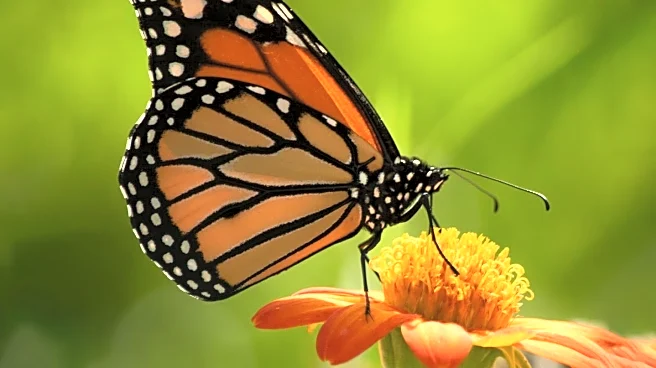What is the story about?
What's Happening?
An injured monarch butterfly at Sweetbriar Nature Center in Long Island has successfully undergone a wing transplant, allowing it to continue its migration to Mexico. The butterfly, which had a ripped-off wing, received a replacement wing from a deceased butterfly of similar size. This procedure was performed using fine tools, and the butterfly was able to fly again, as shown in footage posted by the center. Monarch butterflies are known for their epic multi-generational migration journey from the Northern US to Mexico and Southern California. However, their population has declined by up to 72% between 2012 and 2022 due to the loss of milkweed, their primary food source, leading to their listing as an endangered species in July 2022.
Why It's Important?
The successful wing transplant highlights innovative conservation efforts aimed at preserving the monarch butterfly population, which has been severely impacted by environmental changes. Monarch butterflies play a crucial role in pollination and are an iconic species in North America. Their decline poses a threat to biodiversity and ecological balance. Efforts like the wing transplant not only aid individual butterflies but also raise awareness about the importance of conservation and the need to protect natural habitats. This development could inspire further research and initiatives to support endangered species and mitigate the effects of habitat destruction.
What's Next?
The butterfly's successful recovery and continued migration may encourage similar conservation techniques for other endangered species. The Sweetbriar Nature Center's approach could be adopted by other conservation groups, potentially leading to collaborative efforts to address the decline in monarch populations. Additionally, this event may prompt discussions among environmentalists and policymakers about the importance of preserving milkweed and other critical habitats to support monarch butterflies and other pollinators.
Beyond the Headlines
The wing transplant raises ethical questions about human intervention in natural processes. While the procedure benefits the butterfly, it also highlights the broader issue of human impact on ecosystems. The decline in monarch populations is largely due to human activities, such as the use of herbicides. This event underscores the need for sustainable practices and policies that balance conservation efforts with agricultural and industrial activities.















